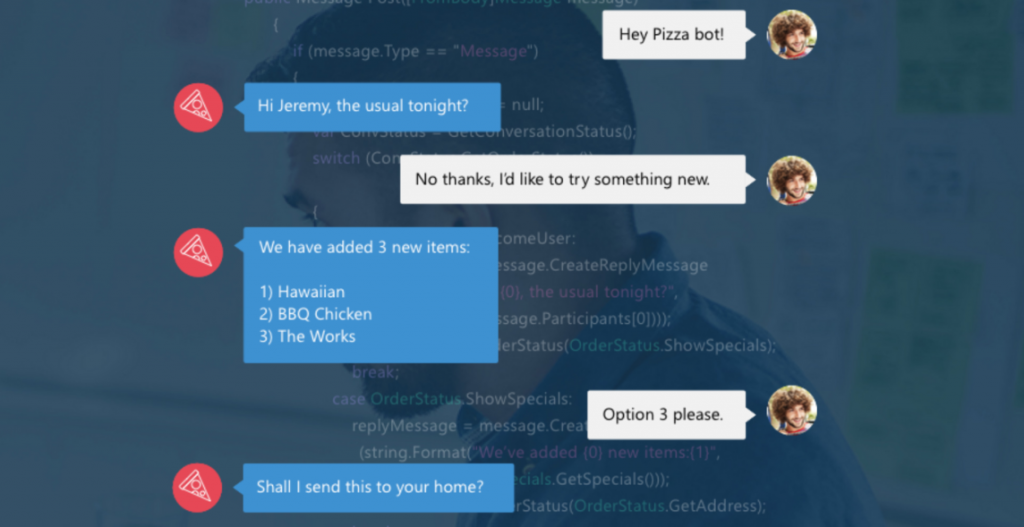Bot's it all about - the rise of bot technology
How we interact with those around us is changing. The once popular worlds of social media and phone apps are in decline and being replaced by social messaging services. Services that’ll let us have conversations with our friends and family, and any other humans we know. Now, they’re also letting us chat with computer algorithms pretending to be humans – otherwise known as bots. Bots are contacts in our social messaging address books provided by retailers, internet mega-giants and such like who want to share their content, product catalogues and streaming media, albeit in more human like ways. We’ll ask bots a question and wait for their answer, and then probably receive a receipt for what they just sold us as well.
Book me a hotel room please, the kind you know I like
Q: I need a hotel room in Manchester for next Thursday night, are either of the hotels I normally stay in available?
A: Yes, both are, which do you want to stay in? You found the nicer but more expensive one was noisy the last time you stayed there, but you didn’t like the breakfast in the cheaper one.
Q: Can you please book me the cheaper one and remind me to go to a coffee shop for breakfast?
A: Sure, I’ve booked it for you and put a reminder for breakfast in your calendar.
When we read the conversation above, it probably reminds anyone who travels on business how valuable it is to find a hotel you like and remember where it is for next time. It also shows how complicated it is to delegate something so personal to someone else.
Imagine then that the conversation above wasn’t with a concierge service, but with a contact in my WhatsApp contacts list. Not a contact for another human who sits in front of a database of hotel availability and remembers my hotel experiences, but a machine learning algorithm that sits on top of a data vault of available hotel rooms and my past feedback questionnaires, wrapped with a natural language interface. An automated service provided by the hotel company to make booking with them again as easy as possible for me and as efficient as possible for them. That’s what bots are about.
Chat bot platforms
For bots to be successful, they need to effortlessly appear in front of their target audience and today there’s no better way to do that than to hook into a social media network. It’s no surprise then that Facebook were the first large brand to promote their bot development platform. Mark Zuckerberg spoke in mid-April about how bots, software powered by artificial intelligence, will soon be helping us write an email, book a hotel or order a t-shirt.
At the same time, Microsoft is readying the Microsoft Bot Framework . An artificial intelligence platform that lets developers create bots using C# and node.JS, and then connect them to Skype, Facebook, Slack, Kik and other messaging services. To enrich the quality of these Bots, Microsoft has integrated it with its Cognitive Services platform, a series of machine learning based intelligence APIs that add a human touch to bot responses by analysing the language we type or tone of voice we use. And then there’s the bot’s goldmine of knowledge, the Cortana Intelligence Suite, that it uses to know what you ordered last time or what you might what to do next time. A series of analytical and machine learning APIs that bots can hook into to dig deep into data to help your supermarket’s bot know you want to buy a new jumper because you don’t like the change in weather, or need a big bar of chocolate because your partner doesn’t appreciate your new haircut.
Bots for the future
Today digital-era consumers want more from their apps. They want personalised and interactive content that’s delivered to them in their favourite format, and increasingly that’s in a messenger service conversation. At the same time, retailer revenues and customer engagement from apps are declining. They need to find a new way to engage with their target audience. Luckily for both groups, the arrival of bots might make both of them feel like winners – just don’t expect to see anyone doing anything life changing with them just yet.
 Gavin Payne is a principal architect for Coeo, a SQL Server and Azure professional services company, and a Microsoft Certified Architect and Microsoft Certified Master. His role is to guide and lead organisations through data platform transformation and cloud adoption programmes. Gavin is also one of TechNet UK Blog's top contributors and was recognised in our Awards earlier in the year.
Gavin Payne is a principal architect for Coeo, a SQL Server and Azure professional services company, and a Microsoft Certified Architect and Microsoft Certified Master. His role is to guide and lead organisations through data platform transformation and cloud adoption programmes. Gavin is also one of TechNet UK Blog's top contributors and was recognised in our Awards earlier in the year.
